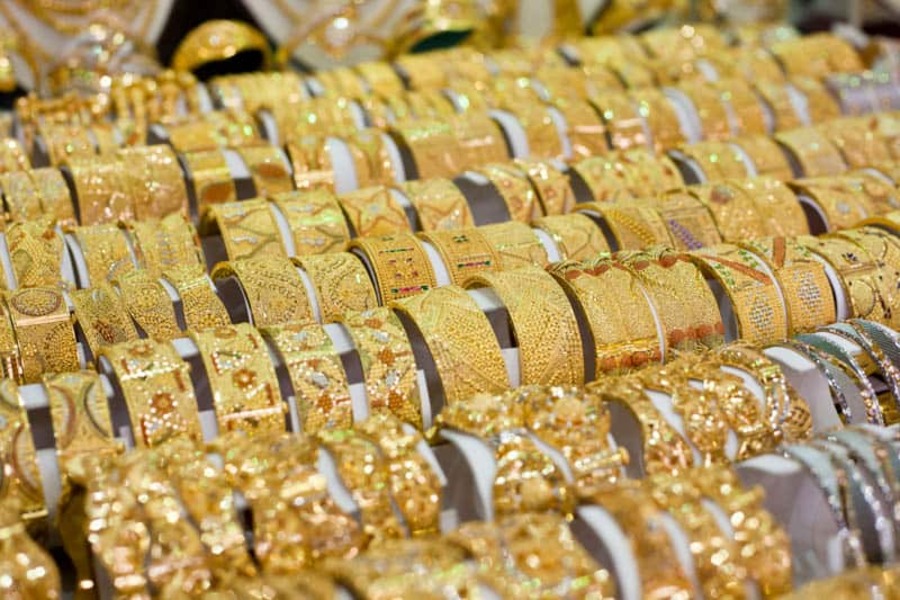
The UAE is known to be a global hub for a range of things including travel, tourism, shopping, and apparently, even gold. This might sound a little questionable considering Dubai doesn’t have any gold mines and imports most of its gold. However, the very fact that it has access to gold from all over the world for retailing makes it a brilliant one-stop-destination for the world’s shoppers.
Think about it. If you go to Italy or Singapore to buy gold, you will only get designs specific to those countries. Same with India, where each state offers a design exclusively from the south, west, north, or east depending on where one is buying it from. However, if you go to any of the retail shops selling gold in Dubai you get all the global designs under one roof.
Moreover, the vast appetite for gold shopping among the different cultures and communities residing in the UAE has made it a large part of foreign trade. Today, gold accounts for 20-30% of Dubai’s non-oil GDP. It has become the UAE’s largest export product after oil, with exports of 17.7 billion U.S. dollars in 2019.
The metal has had a rather interesting journey in the Middle East – from merchants deciding to set shop by the creek or harbor being attracted to the tax-free environment back in the 1900s to it being a more regulated and organized market with more than 175 retail outlets just across Dubai trading in all verticals of the sector including bullion, gold and diamond jewellery manufacturing, wholesale & retail of jewellery, precious metals, diamond and pearl.
Things were looking up for Dubai’s gold market with more retailers coming on board with the announcement of the new Dubai Gold Souk in 2020. However, like most industries, Covid-19 was the unexpected shocker that the thriving gold market or its retailers weren’t expecting.
Indian-born Malabar Gold, one of the biggest gold retailers in the Middle East had been preparing for its regional expansion after being off to a great start in 2020 when the virus came from nowhere and poured cold water on its big plans.
“Like any other industry, we also struggled especially during the lockdown when we had to close down many shops. We slowly opened our shops in four phases. By Q3, things went back to normalcy, and by Q4 we saw exceptional performance”, said KP Abdul Salam, Group Executive Director of Malabar Gold.
If you are wondering how they managed to recover and revive from a global economic crisis that industries are still struggling from, the after-effects of which are expected to last a few years, then you are not alone. When asked about the almost miraculous recovery, Salam said that it’s not just Malabar Gold, but most of the gold retailers are at an advantage.
“This industry performed way better compared to most other industries during the pandemic. Many business owners were facing issues with bank debts that they were unable to pay off due to the halt in operations. But those in the gold industry could easily encash their goods and many retailers used this situation to liquidate their gold assets and clear their bank debts. And the price increase helped cover the cost of making charges saving them from incurring any substantial losses”, he explained.
In 2020, gold prices shot up by 20 to 22% to over $1700 per ounce, which re-instilled people’s confidence in gold and reiterated the narrative of gold being a safe haven for investors during a crisis. Although business was affected in the lower strata and the less expensive categories of gold, the high price segments did exceptionally well.
“People had a lot of disposable income with them, as during the lockdown there weren’t a lot of expenses they had to incur apart from essential items. All the gifts and investments were converted into gold and jewellery. That was another advantage that the industry got”, he added.
So clearly, gold as a commodity became a safe haven for the retailers who were trying to sell. On the other hand, the upward surge in gold rates made it an attractive investment option for buyers, thus increasing its demand in the market.
Today, Malabar Gold is back to planning for its massive regional expansion starting with the four new retail outlets they will be opening in the new Dubai Gold Souk. Yes – the bigger, better, brand new souk, which is also scheduled to open its doors to the public this year.
With more than 250 jewellery and non-jewellery retail stores, the souk is scheduled to open in phases. The first phase of the market will open its doors to the public by April 2021.
“The new gold souk is very much on track. A lot of new companies from around the world have signed the contract in January. We will be opening the first phase of the market by April 2021 and we will see full opening by July 2021”, said Tawhid Abdullah, Chairman of Dubai Gold & Jewellery Group.
With the many promotional schemes and campaigns to attract buyers, Dubai Shopping Festival too is playing an important role in boosting sales. “So far, our promotions are being received very well and currently with the gold prices being favorable to the current buyers, we are expecting a surge with the buying trend during this promotion. Some of the participating outlets have witnessed a 22-30% increase in sales”, he concluded.
Elevate engagement, experience and profitability to unlock retail growth
Marchon Eyewear’s ZEISS wins 2024 Red Dot “Best of the Best” Awards for VisionClip
Revolutionising retail: How RetailGPT is shaping the future of shopping malls
Times Square Center: Building community through more than retail